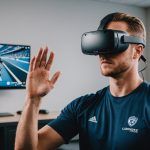Revolutionizing Personalized Nutrition: AI Strategies for UK Health Tech Trailblazers
The Rise of AI in Personalized Nutrition
In the ever-evolving landscape of healthcare and wellness, artificial intelligence (AI) is playing a pivotal role in transforming the way we approach nutrition. The concept of personalized nutrition, which involves tailoring dietary recommendations to an individual’s unique characteristics, is no longer a futuristic dream but a tangible reality. This shift is driven by the integration of AI technologies such as machine learning, natural language processing, and data analytics.
AI systems analyze vast amounts of data from scientific research, personal health records, and food databases to develop personalized nutrition plans. These plans aim to optimize health, prevent diseases, and support overall well-being. For instance, machine learning algorithms can predict nutritional needs based on an individual’s genetic profile, lifestyle, and health status, providing more precise and effective dietary strategies[1].
In parallel : Mastering Remote Work Policies for UK Firms: An In-Depth Blueprint for Success
Key Applications of AI in Personalized Nutrition
Meal Planning and Recommendation
AI-powered platforms are revolutionizing meal planning by generating customized meal recommendations based on individual preferences, nutritional needs, and health data. For example, Samsung Electronics launched Samsung Food, an AI-powered food and recipe platform that offers over 160,000 recipes and acts as a virtual assistant for meal planning and ingredient sourcing. This platform allows users to modify recipes to meet dietary needs, such as creating vegan versions or balancing nutritional content[1].
Nutrient Analysis and Personalized Supplementation
AI is also used in nutrient analysis to identify deficiencies and recommend personalized supplements. Companies like Nutrino Health Ltd. and Nutrigenomix Inc. use AI to analyze genetic data and provide tailored nutritional advice. This approach ensures that individuals receive the exact nutrients they need, enhancing their health outcomes and preventing deficiencies[1].
This might interest you : Creating Engaging Math Apps for Primary Students in UK Classrooms
Allergen and Sensitivity Detection
AI-powered systems can detect allergens and sensitivities by analyzing personal health data and dietary habits. This helps in creating safe and effective dietary plans that avoid harmful ingredients. For instance, AI-driven nutrition platforms can identify potential allergens and suggest alternative foods, making it easier for individuals with allergies to manage their diet safely[1].
Health Monitoring
AI is integral in health monitoring, using data from wearable devices and electronic health records to track nutritional intake and health metrics. Platforms like Hexis use advanced performance science and AI to optimize nutrition plans for athletes, enhancing their performance and recovery. This real-time monitoring and adjustment of nutritional strategies ensure that individuals receive the best possible care tailored to their needs[5].
Market Trends and Growth
The market for AI in personalized nutrition is experiencing exponential growth. From $3.66 billion in 2024, the market is projected to grow to $4.52 billion in 2025 at a compound annual growth rate (CAGR) of 23.7%. This growth is driven by increasing investments in health tech innovation, a growing geriatric population, and the rising adoption of AI for precision medicine. By 2029, the market is expected to reach $10.5 billion, with major trends including the innovation of AI-powered nutrition platforms, the integration of AI with IoT devices, and the use of predictive analytics for personalized supplement suggestions[1].
Regional Insights and Market Dominance
North America currently dominates the personalized retail nutrition and wellness market, driven by the widespread use of cutting-edge technology like wearables, digital health platforms, and AI-driven nutrition solutions. The region’s highly developed healthcare infrastructure and high consumer awareness of health and wellness also contribute to its market leadership. However, the Asia Pacific region is expected to be the fastest-growing market during the forecast period, fueled by rising middle-class populations, increasing disposable incomes, and rapid urbanization[2].
Challenges and Opportunities
High Cost of Personalized Products
One of the significant challenges in the adoption of personalized nutrition solutions is the high cost compared to generic alternatives. This pricing difference can restrict availability for some customers, making it essential for businesses to find cost-effective solutions without compromising on quality[2].
Shift Towards Clean-Label and Sustainable Products
Consumers are increasingly preferring clean-label and sustainable products, which is driving businesses to create customized goods that align with these preferences. This trend opens up new development opportunities for the personalized retail nutrition and wellness sector, as companies must now balance health and sustainability in their product offerings[2].
Real-World Examples and Innovations
AnyDish and Chronic Disease Management
AnyDish, an Israeli startup, is making waves with its AI-based nutrition tool designed for delivering personalized, adaptable dietary solutions for chronic disease management. This platform uses AI to create tailored dietary plans based on individual health data, providing more effective and sustainable strategies for managing conditions like diabetes and obesity[4].
Zydus Wellness and AI-Powered Meal Planning
Zydus Wellness has launched Nutralite Chef, an AI-powered food technology platform that offers meal planning and tailored recipe recommendations through web interfaces and WhatsApp. This platform combines state-of-the-art technologies with food science to address practical nutritional needs, highlighting the company’s focus on technology-driven solutions in the health and wellness industry[2].
Collaboration and Future Impact
The future of personalized nutrition heavily relies on collaboration between tech developers, healthcare professionals, policymakers, and researchers. By focusing on high-quality data, addressing ethical challenges, and keeping user needs at the forefront, AI can revolutionize nutrition science. Here are some key areas of collaboration and future impact:
-
Data Quality and Ethics: Ensuring that AI systems are trained on high-quality, diverse data sets is crucial. Addressing ethical challenges such as data privacy and bias will be essential for widespread adoption[3].
-
User-Centric Design: AI solutions must be designed with the user in mind, providing intuitive interfaces and actionable insights that improve health outcomes.
-
Integration with Healthcare Systems: Integrating AI-powered nutrition platforms with existing healthcare systems can enhance the effectiveness of nutritional interventions and improve patient outcomes.
Practical Insights and Actionable Advice
For individuals looking to leverage AI in personalized nutrition, here are some practical insights and actionable advice:
Embrace Wearable Technology
Wearable devices can provide valuable data on your health metrics, which can be used by AI systems to tailor your nutritional plans. For example, Hexis integrates with wearables to optimize nutrition strategies for athletes in real-time[5].
Use AI-Powered Nutrition Apps
Apps like Samsung Food and Nutralite Chef offer personalized meal recommendations and dietary plans based on your health data. These apps can be a convenient and effective way to manage your diet.
Consider Genetic Testing
Genetic testing can provide insights into your nutritional needs and sensitivities. Companies like Nutrigenomix Inc. use genetic data to provide personalized nutritional advice, which can be highly effective in optimizing health outcomes[1].
The integration of AI in personalized nutrition is a game-changer for health and wellness. With its ability to analyze vast amounts of data, provide tailored dietary recommendations, and manage complex health conditions, AI is set to make healthcare more effective, personalized, and accessible. As the market continues to grow and innovate, it is clear that AI will play a central role in revolutionizing the way we approach nutrition.
Detailed Bullet Point List: Key Applications of AI in Personalized Nutrition
-
Meal Planning and Recommendation:
-
Generate customized meal recommendations based on individual preferences, nutritional needs, and health data.
-
Modify recipes to meet dietary needs (e.g., vegan versions, balanced nutritional content).
-
Act as a virtual assistant for meal planning and ingredient sourcing.
-
Nutrient Analysis and Personalized Supplementation:
-
Identify nutritional deficiencies and recommend personalized supplements.
-
Analyze genetic data to provide tailored nutritional advice.
-
Ensure individuals receive the exact nutrients they need.
-
Allergen and Sensitivity Detection:
-
Detect allergens and sensitivities by analyzing personal health data and dietary habits.
-
Suggest alternative foods to avoid harmful ingredients.
-
Create safe and effective dietary plans.
-
Health Monitoring:
-
Use data from wearable devices and electronic health records to track nutritional intake and health metrics.
-
Optimize nutrition plans in real-time to enhance performance and recovery.
-
Integrate with training calendars and wearables to transform workout data into personalized nutrition plans.
Comprehensive Table: Market Segmentation and Growth
| Segment | Description | Growth Rate |
|---|---|---|
| By Type | Machine Learning, Deep Learning, Natural Language Processing, Computer Vision | 23.7% CAGR |
| By Applications | Meal Planning, Nutrient Analysis, Personalized Supplementation, Allergen Detection, Health Monitoring | 23.4% CAGR |
| By End-User | Individual, Fitness and Wellness Center, Healthcare Provider, Food Manufacturers | 23.4% CAGR |
| Market Size (2024) | $3.66 billion | |
| Market Size (2025) | $4.52 billion | |
| Market Size (2029) | $10.5 billion | |
| Regional Dominance | North America (current), Asia Pacific (fastest-growing) |
Relevant Quotes
-
“We are advancing innovation by combining state-of-the-art technologies with food science to address practical issues,” – Tarun Arora, CEO of Zydus Wellness[2].
-
“By focusing on high-quality data, addressing ethical challenges, and keeping user needs at the forefront, AI can truly revolutionize nutrition science. The potential is enormous.” – PubMed review on AI in nutrition[3].
-
“The UK healthcare market, a global powerhouse, is increasingly open to innovative solutions; it is an ideal partner for Israel’s vibrant startup scene,” – Ronit Applebaum, UK-Israel Tech Hub[4].









